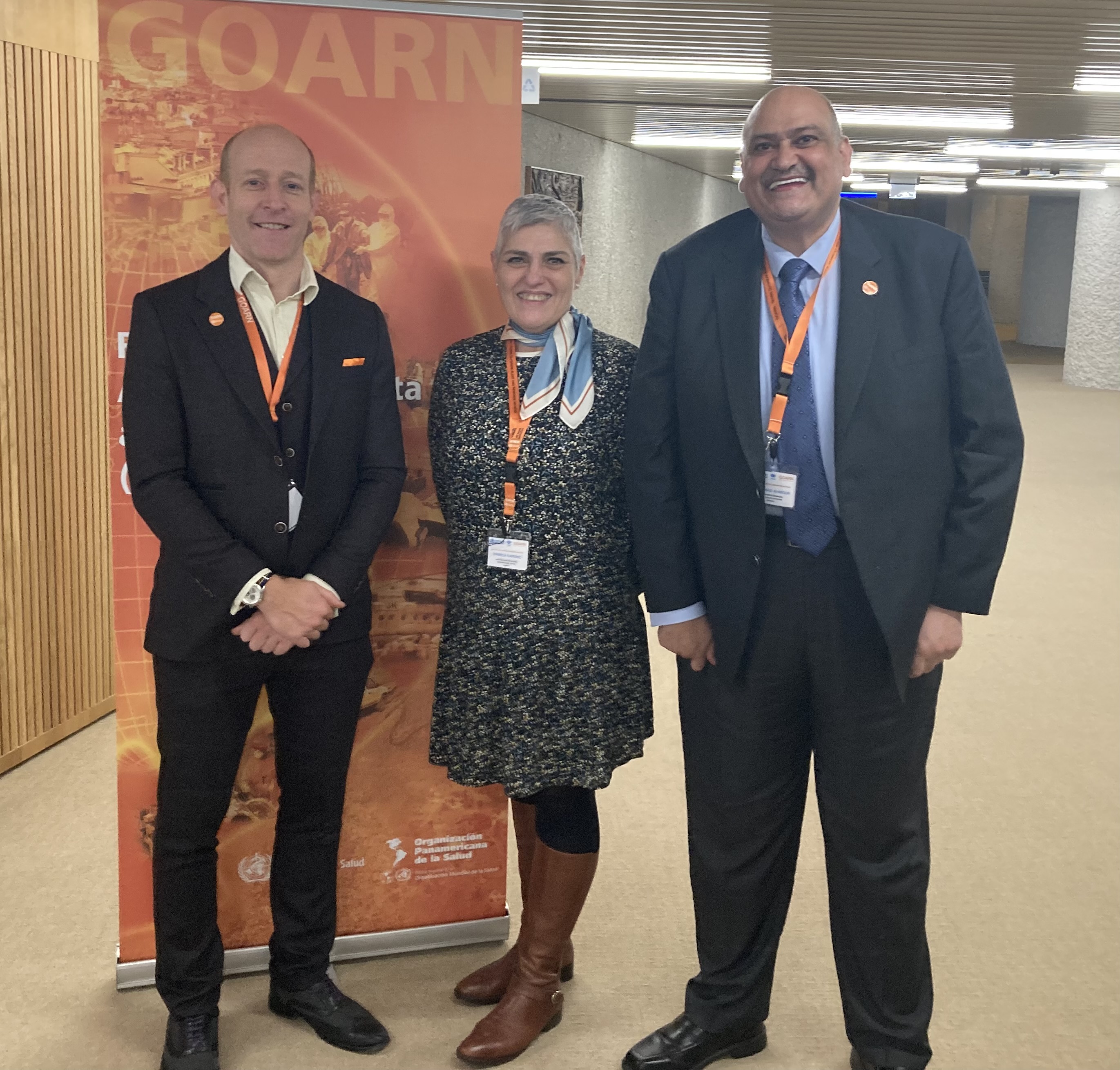
Dr Ed Newman, Director of the UK Public Health Rapid Support Team (UK-PHRST) has recently been elected as co-deputy chair of the Global Outbreak Alert and Response Network (GOARN) Steering Committee. Dr Mohannad Al-Nsour, Eastern Mediterranean Public Health Network (EMPHNET) was appointed as Chair, with Ed, alongside Dr Daniela Garone, Médecins Sans Frontieres (MSF) elected as co-deputy chairs.
Under the new leadership, the Steering Committee and GOARN partners will continue advancing health security, strategic partnerships and communication, and strengthening the emergency public health workforce capacity.
In this interview, Ed explains more about GOARN, what his new role will entail and UK-PHRST’s involvement in the network.
Image: Ed Newman, Dr Daniela Garone and Dr Mohannad Al-Nsour
What is GOARN and why is UK-PHRST involved?
GOARN is a network of over 310 global technical institutions and organisations that respond to acute public health events with the deployment of staff and resources to affected countries. The network delivers rapid and effective support to prevent and control infectious diseases outbreaks and public health emergencies when requested.
UK-PHRST is a GOARN network partner and regularly deploys to outbreaks of infectious disease in response to requests for assistance made by low- and middle-income countries. I’m really proud that UK-PHRST is one of GOARN’s most active deployment partners, meaning we’ve responded to more requests for assistance from GOARN in the last year or two than most other partners in the network.
What does a typical deployment through GOARN look like?
Typically, GOARN will request technical assistance from its network on behalf of a partner who are supporting the national response to an infectious disease outbreak or other public health emergency, such as WHO or UNICEF. This will be a request for assistance in a particular public health discipline such as epidemiology, community engagement, infection prevention and control etc. or for an emergency coordination role such as incident manager, or health coordinator. Where it can, UK-PHRST puts forward offers of assistance to meet the needs of the request. If our offers are selected, we then deploy our experts to join the requesting GOARN partner’s in-country team. This often means being involved in technical advice and coordination at a national level for WHO or UNICEF, whilst working closely with the host country's government on their response. But deployments vary in nature and can involve working within a country office or incident management team in the capital city, to visiting local communities and health centres affected by the outbreak. Typically, we deploy between one to four experts, and deployments usually last for around six to 10 weeks.
What will your role as co-deputy chair of the GOARN Steering Committee involve?
I will form part of the Senior Leadership Team of GOARN alongside my co-deputy chair, and the chair. We will work with other members of the steering committee and the WHO’s GOARN Operational Support Team to ensure GOARN delivers its remit of providing public health response workforce and strengthening national response. We also represent the GOARN Steering Committee and its 300+ partners within the WHO’s Health Emergencies Programme and the wider evolving global health response architecture, as well as at key international meetings where we advocate for GOARN as a network and the important work all its partners contribute to in improving global health security.
Why is this important and what opportunities are there for UK-PHRST?
The Global Health response architecture is going through a period of change with the formation of initiatives such as the Global Health Emergency Corps bringing networks such as GOARN, the Emergency Medical Teams initiative, International Association of National Public Health Institutes (IANPHI), and others together. At the same time, the emphasis on improving readiness to respond to public health emergencies is quite rightly focusing on local and national capacities. During this time of change it is essential that GOARN has strong leadership to ensure the network does its part and maintains its international reputation as a leader in public health emergency response and coordination.
For the UK Public Health Rapid Support Team, this gives us an opportunity to build on our strong reputation in this area and increase our influence on the global stage, further securing our status as key partners in global health security.
What are you most excited for as Co-Deputy Chair?
I am passionate about the power of the GOARN network having first deployed through GOARN in 2012 as a scientist for the UK’s Health Protection Agency, where I supported Uganda’s response to an outbreak of Marburg. I also completed several deployments during the West Africa Ebola outbreak.
I’m excited and privileged to be able to represent this great network and its amazing partners, ensuing it stays at the forefront of global public health emergency response. The level of collaboration and humility within the GOARN partners is inspirational and it is a great team to be part of – where you are constantly reminded of the difference to the lives of those affected by infectious disease outbreaks in some of the most challenging settings in the world.
Also By
- UK-PHRST delivers GOARN Tier 1.5 Orientation to National and International Outbreak Response Workshop to Caribbean Public Health Agency professionals
- UK-PHRST prepares deployees through new peer-learning approach and launches dedicated resource hub for shared learning
- UKHSA Conference 2025: UK-PHRST talks outbreak response sustainability alongside international partners
Useful Resources
Related Articles
-
UK-PHRST delivers GOARN Tier 1.5 Orientation to National and International Outbreak Response Workshop to Caribbean Public Health Agency professionals
BY UK-PHRST -
UKHSA Conference 2025: UK-PHRST talks outbreak response sustainability alongside international partners
BY UK-PHRST -
Green for go: UK-PHRST joins international teams to test-run co-deploying mobile lab equipment and expertise
BY UK-PHRST

Please Sign in (or Register) to view further.